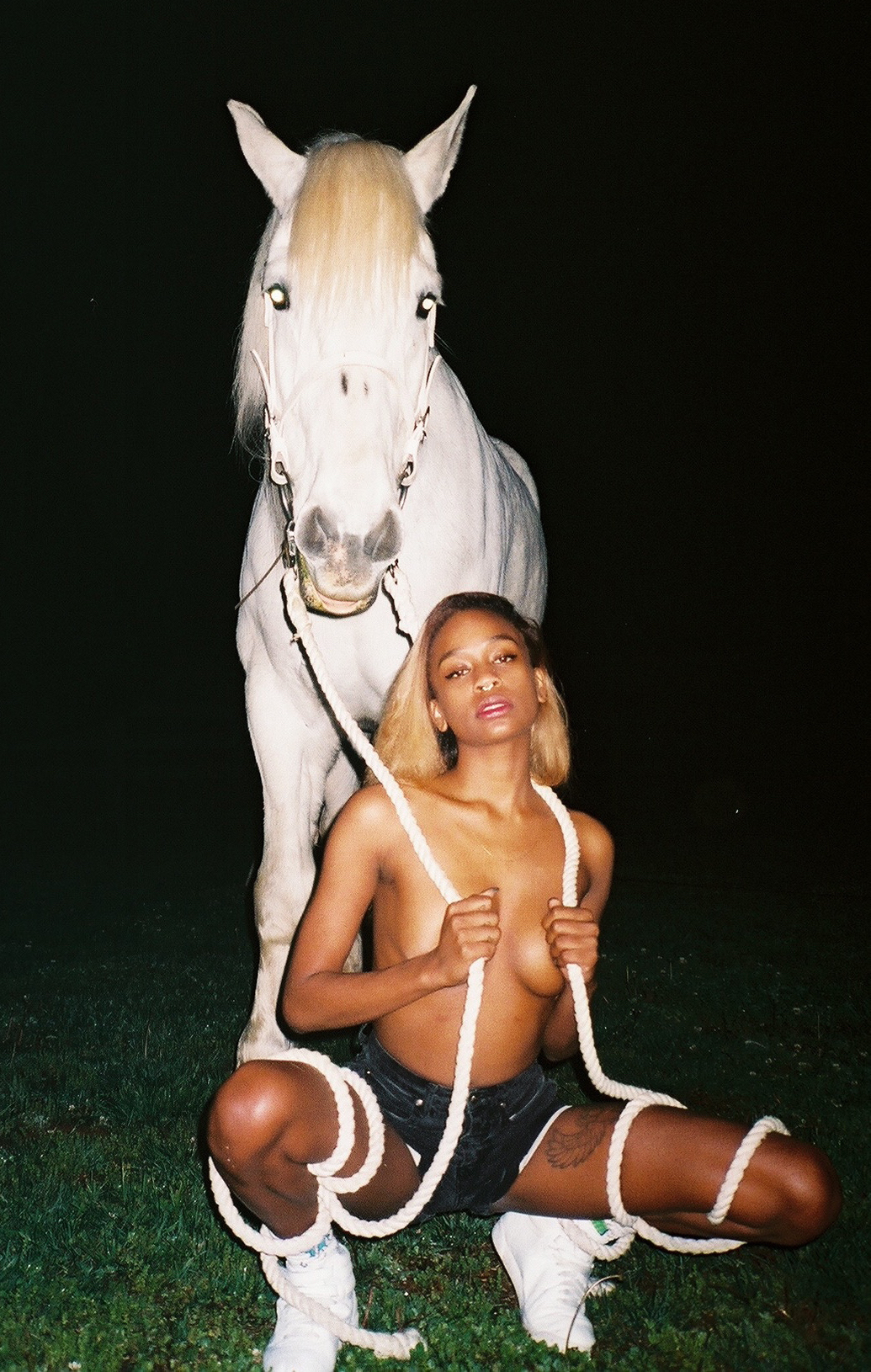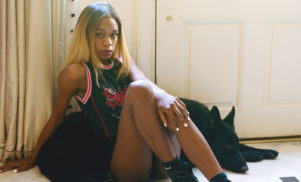Don’t believe what you read – Awful Records singer and producer Abra doesn’t make R&B. Claire Lobenfeld talks to the rising star about her genre-bending new EP, PRINCESS, and why finding a label is like playing Pokémon.
Awful Records has had a vice grip on indie rap nerds’ hearts since Father first told us he’d never whipped a brick but he got the gist. But what sets the Atlanta, Georgia creative house apart from so many other rap collectives is how disparate each member’s sound is even while having a through-line to each other. One of the label boss Father’s most kindred spirits on Awful is singer-producer-composer Abra. Her feathery, silken voice has been haunting us since appearing on Archibald Slim track ‘STYX’ and on her own stirring cut ‘U Go, I Go’ in 2014. Between her 2015 releases, BLQ Velvet and Rose, Abra has become one of the most innovative indie songwriters and harmony-crafters of recent memory. With her latest release PRINCESS – and her first via True Panther – she has widened the synth-heavy, soulful and emotionally tumultuous world she’s built as a musician.
Music has always been a part of her life. Born in Jamaica, Queens, to parents who had been doing missionary work in India, Abra – who keeps her given name and age under wraps – spent her childhood in Tooting, south London, where her parents continued their work among the area’s southeast Asian population. It was at church in London where she cut her teeth in music. “My first memory that I can ever recall is my mom taking me to band practice at church for praise and worship,” she says. “I was sitting on a stool while my mom and this guy played guitar and sang church songs. I never thought I could sing – I kind of assumed everyone could sing [because of church].”
“I became addicted to playing guitar. I learned every song that I liked, from Britney Spears to Waka Flocka and Soulja Boy.”
When she was older, she and her family – including her brother, who was born in the UK – returned to the States and settled in Georgia. With no real concept of her talent for songwriting, she joined her school’s theater class in the drama department. Though she wanted to be an actor, she wasn’t given real encouragement until both her theater class and the musical theater class were putting on a show together. Expected to do a monologue and sing for her audition, Abra’s path as an entertainer was swiftly re-routed as she tried out for the play.
“The choral director stood in front of the class and made an example of me: ‘She’s singing in her vocal range, a range she can control. I know you all want to be sopranos. But this is a perfect example of somebody who is an alto, singing a song in her range, singing a song perfect for her tone,’” she recalls. “It was the first time I felt like anyone had really seen me.”
Motivated by her experience in the choir, an unlikely inspiration tipped her into an obsession with making music. “I struggled with really bad depression when I was a teenager. I had a radio in my room and I had this one experience where I felt like I wanted to hear something that would really [inspire] me because I couldn’t really pick myself up out of it right then,” she says. “The next song that came on [the radio] was called ‘A Soalin’’ by Peter, Paul and Mary. It was so beautiful, it changed my life. I took my mom’s guitar and became addicted to playing guitar. I learned every song that I liked, from Britney Spears to Waka Flocka and Soulja Boy. I played anything I could sing on guitar. I snowboarded down that hill. It’s a blur how fast it happened after that.”
She posted acoustic rap covers on YouTube which were nothing to bristle at, and they were also the breadcrumbs that led Father and Awful Records to her. “A mutual friend invited me to a party and video shoot for a collaboration of theirs,” says Father over email. “I saw her in the kitchen doing a keg stand and I’m like, ‘Oh, it’s lit.’ I got drunk as shit and don’t remember the rest of the party but I hit her up shortly after the video came out. Her energy in it was hypnotizing.”

Her vitality soon caught the attention of people outside of their collective. ‘U Go, I Go’, the first single from her early 2015 EP BLQ Velvet, was premiered on The Juice, Billboard’s rap and R&B column, despite Awful being far away from the charts. As an introductory piece, it displays the dexterity she’s always had at layering her vocals and making the harmonies as much a part of the musical composition as any instrumentation or programmed beats. In places, like the song ‘I Guess’, it sounds as if she had created her own girl group out of a collection of other Abras.
Her full-length Rose is where she particularly began to sparkle, maintaining the lo-fi bedroom feel of Velvet but with a sound imbued with reverence for both Whitney Houston and dream-pop (whether intentional or not). She is meditative on ‘Fruit’, lustful but aching on ‘Pride’ and fills ‘No Chill’ with a heft of dark disco. Both records are products of locking herself away in her closet studio with an aesthetic landscape already mapped out in her head. It’s the kind of music that makes fans tell her she helped them through breakups and emotional hang-ups. Abra, herself, was so attached to both projects that she felt a sense of loss after they were completed: “It was like postpartum depression.”
Still, she was able to stay attached to the fruits of her labor when she was on tour supporting 4AD artist Empress Of last fall. It was that trip which brought her into contact with True Panther Sounds label head Dean Bein, who approached her backstage after a performance at III Points Festival in Miami. She had been added as a last minute addition to the line-up so that her hotel room would be paid for by the festival and she wouldn’t have to find accommodation for herself while the Empress Of tour was punctuated by the solo booking. The way Abra tells it, she was sure Bein had no prior knowledge of who she was, but he was already a fan. “I went to go see an Awful showcase at S.O.B.’s [in New York] just after Rose had come out,” he says. “Every time I came back [to the record], I got a deeper feeling from the songwriting, production and her voice, and realized that the music she’d already been making had so much depth and feeling and maturity to it.”
“People call me ‘up-and-coming R&B’ and I’m like, nah, I’m not”
Learning that Bein was managing Kelela piqued Abra’s interest in working with him. “We had a super heated discussion about black women being boxed into R&B and how it’s kind of like a death match where there can only be one girl who’s poppin’ at one time,” she says. “I fucked with the fact that he’s really ground level.” That hands-on style is important to her. Even the deal with True Panther is only to release PRINCESS: “It’s the perfect way to see if I want to be on a label or not.” The few major label meetings she took made her feel like a number bouncing between waiting rooms: “It was like Pokémon,” she says. “I was just waiting for the next Pokémon trainer [who did want] to see what was going on in my head.”
The way Bein talks about working with Abra, it’s clear that he is deeply invested in her as a person. “It’s so rare to find somebody who has an extremely strong sense of identity for both themselves and their music who can write, produce, sing and make music that is really specific and credible, but also potentially really universal.” Abra is already familiar with the universality of her first records, knowing that they’ve helped her listeners get through some shit. For her, PRINCESS is experimental, but only as far as process goes. This time, the beats came first and the lyrics came second. Yet, not having years-old poetry at her disposal doesn’t see the record suffering from a lack of passion and melodrama.
In such a concise collection of songs, it’s hard to really choose a standout. ‘Cry Baby’ pulls from her previous pop totems while resting the harder emotions on her subject not herself, while ‘Vegas’ flirts with the power in what isn’t said but expressed in whispered nothings. If these songs don’t carry the same heartbroken tones to Abra as her previous work, they are still worlds where romance is just as tricky – they just deal with both sides of a difficult coin.
The plinky ‘Pull Up’ is where she veers into almost completely new territory, with freestyled lyrics about a whole new kind of liaison: “Pull up to your crib, riding shotty shotty / Pull up with your bitch, now it’s a party / Strawberita wavy baby, feelin’ crazy / Said I’m crazy, you ain’t seen shit.” It sounds like the girl Father described doing a handstand on a vat of cheap beer, but it also refuses to recede from her signature sound. Even when Abra is showing up with your girl, she tells it in a way that is distinctly hers: dark but cool, expressed in layers of vocals where she is her only harmony partner and her own voice is constantly challenging her to go somewhere new.
Ultimately, PRINCESS is Abra’s Art Angels — or at least the precursor to it — in that it is more refined and polished, more about the artist she wants to continue to grow into, not staying put as the one she is now. It also proves that pushing her into the R&B box is a mistake. She has more in common with women like Glasser and Tamaryn, who have also released music via True Panther, and with Grimes, whose career trajectory Abra admires.
Like these artists, she should be afforded the same genre-eluding distinctions. “People call me ‘up-and-coming R&B’ and I’m like, nah, I’m not,” she counters. She sees people increasingly viewing culture on a gradient scale, but she can still be confined by strict perceptions of how people view the way music is supposed to be categorized. “I got a little soul in my voice, but I wouldn’t say I’m an R&B singer at all,” she says. “People are just now starting to realize that, and it’s hard for people to come out of that box and [see] a black woman that isn’t singing R&B. You can’t put people in boxes based on what they look like or what you think they should be doing.”
Assassination Nation is out now in the US and hits UK cinemas on November 23
Read next: The essential… Italians Do It Better






























